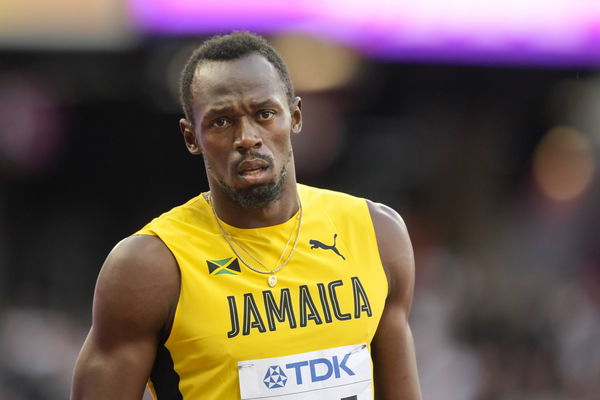

Usain Bolt. That name? Pure speed and records wrapped up in one unstoppable force. With eight Olympic golds, plus world records in the 100 meters, 200 meters, and the 4×100 meter relay, you don’t even have to ask—everyone knows the lightning bolt guy. Bolt called it quits in 2017 after a career full of insane victories, all following a tough hamstring injury back in 2014. But let’s rewind back to 2002 when the world was first introduced to what was to become a phenomenon. By this time, Bolt was already earning his nickname, ‘Lightning Bolt,’ after he triumphed in the 200-meter race in the World Junior Championship in Kingston, Jamaica, when he was only 15 years old.
Bolt achieved the record of the youngest-ever world junior gold medalist. That was just the beginning. Let’s move to 2004 when he was all set to defend the World Juniors title–but boom, a hamstring injury hit him out of the race. And now, Usain Bolt remembers that anger, so full of despair over that injury that ruined his plans of dominating major championships.
In his book Faster than Lightning, Usain Bolt takes us inside a painful chapter of his career when injuries left him frustrated and questioning everything. He recalled, “The defence of my World Juniors title was under threat. I was gone, shot, and everything went downhill from there.” He didn’t just deal with the physical pain—he had to face a mental battle as well. The rehab was grueling, a long and drawn-out process. “I was told to spend weeks resting and recuperating, which was a serious drag,” he said, as his recovery felt like it was robbing him of time. But as the injury progressed, it was more than just the physical healing that tested him. Bolt realized, “Pain thresholds, patience and inner strength are things that can’t be found in a running magazine,” a harsh truth he learned through experience.
ADVERTISEMENT
Article continues below this ad
Through the endless rehab drills, he began to confront the doubts creeping into his mind. “Injury… asked questions. It said, ‘Yo, Bolt, can your body handle coming off that corner like a slingshot?’ Or, ‘Are you going to survive bursting out of the blocks that hard?’” These mental questions shook his belief in his invincibility, something he’d once felt after his early successes. When he was finally fit enough to run again, his confidence had been deeply shaken. “Full fitness, the kind I’d previously experienced following my success in the World Juniors, had given me a feeling of invincibility.” But that confidence was gone, and as he tried to rebuild, negative thoughts followed him everywhere. “I tried to put it to one side and focused on getting my fitness back,” he said, though it wasn’t easy.

Even worse, his coach told him to forget about defending his World Junior title. “He figured that I wouldn’t be ready. Talk about a bummer,” Bolt admitted, and it stung. Missing that title defense wasn’t just about the race; it felt like everything he had worked for had come crashing down. “Winning in Kingston had been such a wonderful experience that I’d wanted to do it again,” he said, but the injury stole that opportunity, leaving him with only the bitter taste of what could’ve been. To make matters worse, the headlines from the competition hit harder than the injury itself. “[Andrew] Howe had won the 200 in only 20.28 seconds… I could have clocked 20.28 seconds in my sleep, given half the chance,” Bolt reflected, knowing the victory was his if only he had been healthy enough to race.
Back in 2004, the spotlight at the World Juniors in Grosseto shifted in a big way when Andrew Howe, the Double World Junior champ, stepped up and grabbed the Long Jump and 200m golds. Meanwhile, Usain Bolt—who had stunned the world with his 200m World Junior record and his gold in 2002—was nowhere to be seen. He didn’t race in the 2004 World Juniors, and that absence hit hard. It wasn’t just the race that stung; it felt like the supporters who had rallied behind him in ’02 turned their backs on him when he needed them most.
ADVERTISEMENT
Article continues below this ad
What’s your perspective on:
Did Usain Bolt's setbacks make his triumphs even more legendary, or did they tarnish his legacy?
Have an interesting take?
Usain Bolt reveals coming closer to quitting!
According to Daily Mail UK report from 2013, in 2006, Usain Bolt faced a major setback in his career and it almost made him quit track. It was during a 4x400m race in Kingston, Jamaica that Bolt pulled his hamstring mid-race and had no choice but to limp off the track. And that’s when the crowd, his own people, turned on him. As he hobbled off, some fans started booing him, and a few even shouted that he’d given up because he knew he wasn’t going to win. Imagine that—the same crowd that had cheered him on when he’d snatched gold at the World Juniors in 2002 was now turning on him.

via Getty
RIO DE JANEIRO, BRAZIL – AUGUST 14: Usain Bolt of Jamaica points to the sky before winning the Men’s 100 meter final on Day 9 of the Rio 2016 Olympic Games at the Olympic Stadium on August 14, 2016 in Rio de Janeiro, Brazil. (Photo by Patrick Smith/Getty Images)
In an emotional moment, Bolt admitted in his autobiography, that he questioned everything: “Honestly, I had never imagined a time when a Jamaican crowd – my own people that had cheered me on so loudly when I’d won the World Junior Championships in 2002 – would boo me as I came off the Kingston track.” To have a shoot of pain from an injury was something he could endure, but to be rejected by his fellow city people he never expected.
ADVERTISEMENT
Article continues below this ad
However, after a heart-to-heart session with his coach Glen Mills, he was able to sit back and understand that he still had it in him. Fast forward to 2008, and it was at the Beijing Olympics that Bolt emerged into the world champion we have today. He won two golds in 100m and 200m and is therefore dubbed ‘Lightning Bolt.’ And that wasn’t a one-time thing—he went on to do the exact same thing in 2012, making his name synonymous with speed and greatness.
ADVERTISEMENT
ADVERTISEMENT
ADVERTISEMENT
ADVERTISEMENT


Did Usain Bolt's setbacks make his triumphs even more legendary, or did they tarnish his legacy?